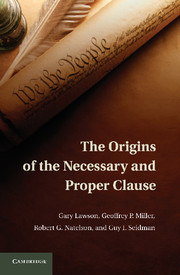Book contents
- Frontmatter
- Contents
- Acknowledgments
- 1 Raiders of the Lost Clause
- 2 Discretionary Grants in Eighteenth-Century English Legislation
- 3 An Ocean Away
- 4 The Legal Origins of the Necessary and Proper Clause
- 5 The Framing and Adoption of the Necessary and Proper Clause
- 6 Necessity, Propriety, and Reasonableness
- 7 The Corporate Law Background of the Necessary and Proper Clause
- Index
2 - Discretionary Grants in Eighteenth-Century English Legislation
Published online by Cambridge University Press: 03 May 2011
- Frontmatter
- Contents
- Acknowledgments
- 1 Raiders of the Lost Clause
- 2 Discretionary Grants in Eighteenth-Century English Legislation
- 3 An Ocean Away
- 4 The Legal Origins of the Necessary and Proper Clause
- 5 The Framing and Adoption of the Necessary and Proper Clause
- 6 Necessity, Propriety, and Reasonableness
- 7 The Corporate Law Background of the Necessary and Proper Clause
- Index
Summary
The U.S. Constitution uses a wide variety of formulations to describe the discretion granted to various actors. The Constitution often grants discretion without specifying any constraint on the exercise of the granted power. The Census Clause, for example, provides that enumerations of persons shall be made within ten-year intervals “as … [the Congress] shall by Law direct,” with no textual indication that such laws must direct the census in any particular manner. Indeed, the vast majority of the power grants in the Constitution, including the principal grants of power to Congress in Article 1, section 8, simply describe the power granted without any adjectival prescription of the manner in which the power may be employed.
Sometimes those powers are to be exercised only when certain objective conditions have been satisfied: For example, Congress may not suspend the writ of habeas corpus “unless when in Cases of Rebellion or Invasion the public Safety may require it” and states may not engage in war “unless actually invaded, or in such imminent Danger as will not admit of delay.” But the objective conditions in these clauses use nouns (rebellion, invasion, danger) rather than adjectives to describe the range of circumstances in which it is permissible to exercise the power.
- Type
- Chapter
- Information
- The Origins of the Necessary and Proper Clause , pp. 13 - 34Publisher: Cambridge University PressPrint publication year: 2010
- 1
- Cited by



